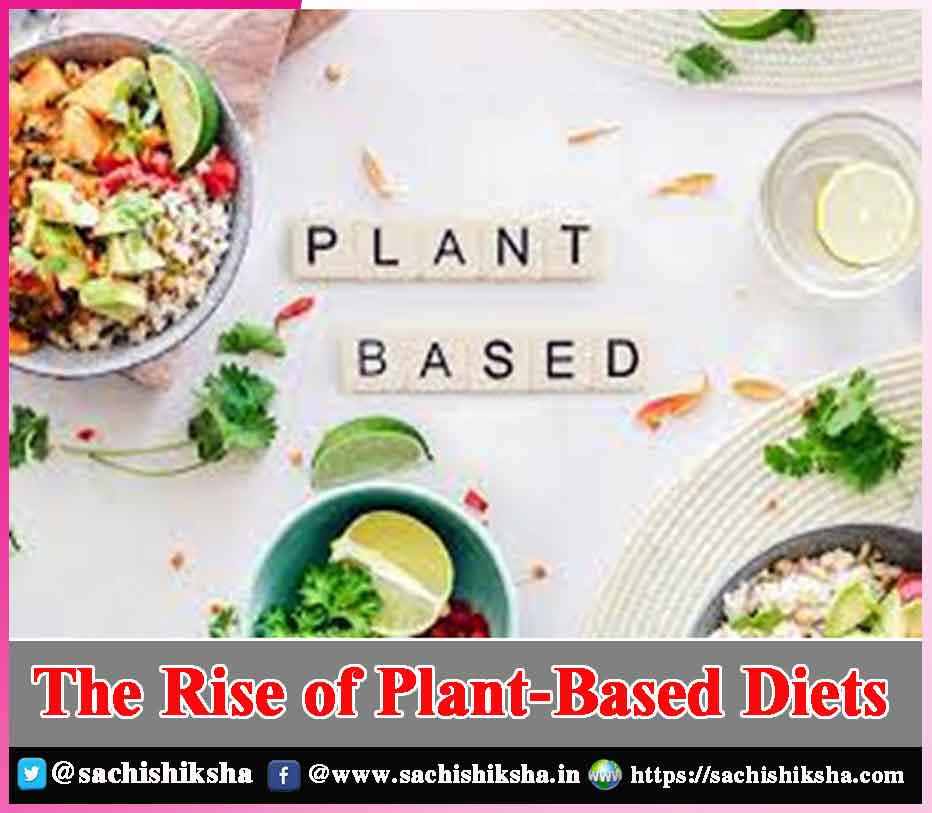The Rise of Plant-Based Diets
Introduction:
In recent years, a remarkable shift in dietary patterns has swept across the globe, transforming how we view food and its impact on our health, the environment, and animal welfare. The rise of the plant-based diet is no longer a passing trend; it is a powerful movement advocating for a more sustainable, compassionate, and healthier lifestyle.
Also Read:
The Environmental Impact

By contrast, plant-based diets are more sustainable. Plant foods generally require fewer resources, such as water and land, to produce. Adopting a plant-based lifestyle can significantly reduce an individual’s carbon footprint, making it essential to stop future environmental protection and combat global warming.
Table of Contents
Health Benefits
Apart from its environmental impact, plant-based diets offer many health benefits. Diets high in fruits, vegetables, whole grains, legumes, nuts, and seeds, among other foods, have repeatedly been demonstrated to lower the risk of chance of developing chronic conditions such as type 2-diabetes and heart disease.
Typically low in cholesterol and saturated fat, these meals are high in fiber, vitamins, minerals, and antioxidants that improve general health—several cancers. Moreover, plant-based diets can contribute to weight management and improved digestion. They often lead to lower calorie intake, which can assist in preserving a healthy weight and weight loss. The abundance of fiber in plant-based foods supports healthy digestion, reduces constipation, and fosters a diverse and beneficial gut microbiome.
Ethical Considerations
The ethical aspect of the plant-based diet movement cannot be ignored. The traditional animal agriculture industry often raises animals in confined and inhumane conditions, leading to animal suffering. Advocates of plant-based diets believe in promoting a more compassionate approach to food consumption, choosing options that avoid the exploitation of animals. The growing awareness of animal welfare issues has driven many people to embrace a plant-based lifestyle.
Innovation and Culinary Creativity
The rise of plant-based diets has also sparked innovation in the food industry. Restaurants, food companies, and entrepreneurs have responded to the demand for plant-based options by developing various delicious and nutritious plant-based products. From plant-based burgers that mimic the creaminess of milk, these innovative products cater to the changing preferences of consumers.
Moreover, plant-based cooking has evolved into a culinary art form, attracting chefs and home cooks alike to experiment with various plant-based ingredients and flavors. This newfound creativity has elevated plant-based cuisine to new heights, dispelling the notion that plant-based eating is bland or limited.
Social and Cultural Influence
The plant-based diet movement has not only captivated individuals but has also influenced societies and cultures around the world. Prominent figures, including celebrities, athletes, and environmental activists, have endorsed and adopted plant-based lifestyles, raising awareness about the benefits of such diets. Social media platforms have played a pivotal role in spreading the message, connecting like-minded individuals, and creating a supportive community for those transitioning to plant-based diets.
In addition, several documentaries and books have shed some insight into how animal agriculture affects the environment, animal welfare, and human health. These educational resources have played a crucial role in fostering a more informed and conscious consumer base, contributing to the rise of plant-based diets.
Challenges and Misconceptions
While the plant-based diet movement is gaining momentum, it faces some challenges and misconceptions. One common concern is the perceived difficulty of obtaining all necessary nutrients from a plant-based diet. But with careful preparation and a diversified diet, it is possible to meet nutritional needs through plant-based sources. Dietary supplements can also bridge any potential gaps.
Another misconception is that plant-based diets are more expensive than conventional diets. Some plant-based products can be costlier, but staples like beans, grains, and vegetables are often more affordable than animal products. With increasing demand and economies of scale, the cost of plant-based options is gradually becoming more accessible.
The rise of plant-based diets marks a significant paradigm shift in how we perceive food and its impact on our world. By choosing plant-based alternatives, individuals can contribute to a more sustainable environment, improve their health, and demonstrate compassion for animals. This green revolution is not just a fleeting trend; it is a powerful movement with the potential to shape the future of food and create a positive impact on our planet.
Conclusion:
As plant-based diets continue to gain popularity, it is crucial to remain open-minded, supportive, and have understanding of different dietary choices. Embracing a plant-based lifestyle is a personal decision, and by collectively encouraging sustainable and ethical choices, we can foster a healthier, greener, and more compassionate world for generations to come.














































